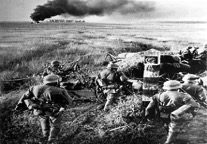Many things contributed to the fall of the Nazi Regime. People argue that Nazi ideals led to the failure of their plan for European dominance. Some say that it was the concept of “Lebensraum,” the need of living space for Germans, and others point out that the loss of World War II by Nazi Germany led to their downfall. All of these factors are true, but if we look deeper and focus in on some of the events that Nazi Germany took part in during World War II, we can pin the failed invasion of the Soviet Union, known as Operation Barbarossa, as one of the key contributing factors to the demise of Nazi Germany and everything the country stood for. This operation was an “all or nothing” operation, which meant that failure was not an option for Nazi Germany. Operation Barbarossa led to German Soldiers holding the fate of their country in their own hands as the very existence of Nazi Germany was at stake.1
In 1925 Hitler wrote the famous book Mein Kampf, which contained Hitler’s political beliefs and his plans for Germany. Hitler believed that Slavs were not part of the Aryan race, and he deemed them inferior. Mein Kampf emphasized the need for German living space, otherwise known as “Lebensraum.” To achieve this, the Germans would have to turn towards the East and focus on the Soviet Union, which would result in Hitler fighting a war on two fronts.2
The Germans began preparations as early as February 1941, anticipating that the invasion would commence during mid-May of 1941. However, due to the Balkan campaign, the date was pushed back to June 1941. The five-week delay shortened the time available to invade the Soviet Union. Hitler predicted a swift invasion, lasting only a few months, because of his rapid success in other parts of Europe. However, these successes led to Hitler being over confident, because he believed he was a political and military genius. Hitler didn’t anticipate war during the Soviet winter, and German soldiers lacked the adequate clothing and supplies to fight a war during the winter months. This would prove to be fatal to the German army as they were not prepared. On the other hand, the Soviets were also inadequately prepared. Although they had more numbers than their German counterparts, they lacked equipment or had poor quality equipment, and had worse training than the Germans. The quickly coming winter and with the Soviets lacking equipment and training, it was essential that the Germans achieved a quick victory.3

The initial offensive started June 22,1941. There were around four million German troops along with hundreds of thousands of Italian and Romanian troops. The Germans split themselves into three army groups, turning their focus to different parts of the Soviet Union. Army Group North would head to Leningrad, Army Group Center would head towards Moscow which was the Soviet capital. Army Group South would head south into Ukraine which was the center for Soviet industry and mining and had sufficient farmland for Hitler’s concept of “Lebensraum.” The Soviet south was also very rich with petroleum which was another deciding factor in the invasion. At first the invasion along the 1,800 miles took everyone in the Soviet army by surprise as the Germans were able to catch the Soviets unprepared.4
The first few weeks of the invasion were swift and fast, but by mid-July a series of rainstorms slowed the German advance deep in the Soviet Union. The rainstorms made the path treacherous for the Germans as the dirt and sandy roads turned muddy, making it difficult for German wheeled vehicles to advance. The Nazi Army made little progress with their offensive. Soviet troops would often do as much as they could to slow down the German advance, which included them burning crops, destroying bridges, and evacuating factories as they retreated. Furthermore, steel and munition plants in the West were destroyed and shipped to the East. The Soviets also destroyed most of their rail stock, depriving the Germans of use of the railroad system. Despite the Soviets doing everything in their power to slow the German attack, it still wasn’t enough, and by mid-July, the Germans had advanced more than 400 miles. The Germans were only 200 miles west of Moscow, the Soviet capital. There was still time to make significant advances before the onset of winter, but the opportunity broke down when Hitler and his generals had disagreements on where the German army would shift its focus to next. A quick victory was still essential to the German Army.5

Ultimately, after the Battle of Vyazma, which was a twenty-day battle that led to a German victory, the Germans had a clear path to Moscow. Moscow was not only the capital and largest city of the Soviet Union, but it was also one of the main military and political objectives for the Axis powers during the invasion. In early December 1941, the Germans were at the gates of Moscow with many of the troops exhausted and tired. Many of the Soviet forces were fresh, yet the Germans were so close to Moscow, it was hard to resist advancing to capture Moscow. Victory was in the Soviets’ sight, especially because of the onset of winter in the Soviet Union, which is one of the coldest countries in the world. The Germans suffered greatly during this harsh Soviet winter. The sub-zero temperatures were the most severe in decades. Frostbite decimated German troops, many of whom were already exhausted or had fallen ill due to the temperatures. Provisions were also not made for the German troops. They had very little clothing for the winter because Hitler and his generals thought the invasion would be swift. Many troops starved or froze to death. The freezing temperatures also immobilized many of the Germans’ transportation, artillery, and aircraft. In addition, many of the German supply lines were vulnerable to attacks from behind. Getting provisions to the troops up front was a difficult task for the Germans. The number of casualties the Germans faced were unheard of among the Nazis, as they barely had any losses in their previous campaigns during this war. The Soviets’ experience with the poor weather differed from the Germans. The weather was perfect for the Soviet Red Army as they were used to it and tended to fight better in freezing temperatures. 6

The turning point for Operation Barbarossa came as the drive to Moscow started to stall. The Soviets were poised for a counter offensive and were able to exploit the Germans when on December 6th, 1941, Gen. Georgy Zhukov of the Soviet Union launched a counter offensive against the Germans that the German army was never able to come back from. Many of the troops used in the counter offensive were Siberian troops who were very effective fighting in colder weather. This counter offensive drove the Germans away from Moscow and ultimately pushed them back all the way to Berlin. 7
So this leads back to the question of whether Operation Barbarossa was Hitler’s biggest failure that cost Nazi Germany World War II? The short answer would be yes, but to expand on this, we can see that Hitler and his generals made many mistakes and mishaps. Their goal to invade and overtake the Soviet Union was unrealistic from the beginning. The only reason why success seemed realistic was the fact that before Operation Barbarossa, Germany was dominating Europe and they weren’t experiencing any significant losses in these battles. The German Army was a war machine that was decimating their enemies. For this very reason Hitler and his generals grew overconfident. They were so confident they thought Operation Barbarossa wouldn’t be a long invasion and that there weren’t going to be many casualties. However, Hitler’s thinking was wrong. The Germans experienced more casualties on the Eastern front fighting the Soviets than they did on any other front. Overconfidence led Hitler to make irrational decisions for the German Army that made them not only lose the war, but also it led to a turning point in which Hitler would lose Germany as he knew it. Winter played a huge part as many of the German preparations were not geared towards fighting during the winter months. The Soviets were better suited to fight during the winter than the Germans. Without proper clothing, provisions, and other equipment needed to wage a war during the Soviet winter, Germany began to struggle towards their demise. Ultimately, Hitler was so obsessed with “Lebensraum” that he couldn’t grasp the consequences if he had failed. However, all of what Hitler had hoped for Germany would be gone by the time Germany fell to the Soviet Union.8
- Martijn Lak, “Operation Barbarossa and Germany’s Defeat in the East,” German History, Volume 29, Issue 2 (June 2011): 335–337. ↵
- H.W. Koch, “Operation Barbarossa-The Current State of the Debate,” The Historical Journal 31, no. 2 (1988): 388-390. ↵
- Britannica Encyclopedia, s.v. “Operation Barbarossa,” by John Graham Royde-Smith. ↵
- David M. Glantz, Operation Barbarossa:Hitler’s Invasion of Russia 1941(The History Press: Stroud, UK, 2011), 31-42. ↵
- Wikipedia, 2018, s.v. “Operation Barbarossa.” ↵
- Wikipedia, 2018, s.v. “Operation Barbarossa.” ↵
- Britannica Encyclopedia, s.v. “Operation Barbarossa,” by John Graham Royde-Smith. ↵
- Robert Smith Thompson & Alan Axelrod, Nazi Germany(New York;2018), 240-251. ↵



53 comments
Hannah Hennon
This article was good to read. Operation Barbarossa was for sure a failure for Nazi Germany. I had heard about this topic before. I only had really known about the harsh winters. I never knew about the Soviet Union’s counterattack on Nazi Germany. This article did a good job at describing the details of the event and what had happened. It was an interesting topic.
Sebastian Portilla
Greed was the issue. Hitler could’ve easily won the war. The machinery was outright most efficient. Russia was just to big to take over and wasn’t In the right conditions. This is a very cool article because not a lot of people know how close Germany was to winning the war. Germany had many of their troops die of natural causes then actual bullets in Russia and when the Germans need reinforcements and assistance they were screwed. Love this article!
Zachary Fisher
Operation Barbarossa was probably the biggest mistake that the German military command made, but it wasn’t the only one. Although Germany and its allies had control on most of continental Europe, they were struggling against allied forces in northern Africa and were starting to spread themselves too thin. The timing for the invasion was not ideal for Germany in the long run. Perhaps if the Germans had better equipment suited for winter and the Soviets never implemented the scorched-earth policies, then the Germans may have been successful over the Soviet Union.
Kenneth Gilley
I does seem like the failure of Operation Barbarossa was a turning point in World War II. The savage harshness of Russian winters must have come as a shock to the German troops. It was interesting to read about the Russian counter attack. Disasters like this are just what happens when someone get overambitious and ignores risks. Another lesson that this story drives home is that you never, never invade Russia in the winter! Hitler was definitely not the first person to discover that the hard way.
Nicholas Robitille
Before this paper, I had never known that the soviet union was equally unprepared to fight the war. I had assumed that the Russians were prepared to fight the war and only the Germans were unprepared. In history, it seems that the theme is being entirely unable to conquer Russia due to the winter. (exception mongols). I was equally unknowledgeable on the Soviet Union’s counterattack on Germany. I had thought prior to this that the Soviets had just starved and out supplied the Germans until they all died or went home. This article gave me much to think about. Thank you.
Noah Wesolowski
While Germany started off the war strong by conquering many of the countries around them. They just did not have enough manpower and resources to fight against America and Russia. Invading Russia was one of Hitler’s larger failures as the army did not have the necessary resources to push through to cold and chase the red army further into Russia.
Joshua Garza
This is a great article. I love reading about world war two. This failed attempt by the Germans is a repeat in time with the fact that nobody has been able to successfully invade the Soviet Union because of the terrible conditions that the Russians are so accustom to and that the rest of the world is not. Not even Hitler nor Nepolian could successfully pull off this great militaristic task.
Tyler Reynolds
Just simply saying that Hitler could have been a wee bit less harsh on the occupied territories of Russia. Many people had already become disillusioned with the current communist regime with outrageous quotas and massive deportations to gulags or executions. When Hitler had come through the territories, not only did he not ease up the quotas from the populace but he also destroyed cultural relics of the Russian people.
Michael Leary
Very interesting article. It really seemed as if this military operation was a real turning point in the second world war and it seemed as if Hitler was too ambitious and power hungry. The original plan was surprising and must have caught the Soviets off guard as they had a non-aggression pact at the time, but, it just goes to show that you have to conquer before the Russian winter, you can ask Napoleon about that as well.
Mariah Garcia
Never invade Russia in the winter. Hitler, as amazing as a leader as he was, and as horrid as his intentions were, had to have some semblance of doubt about his plans. Though to say that the fault falls completely on Hitler’s shoulders would be obtuse. There were many others involved in this from the ground up, yet history always beguiles the victors.